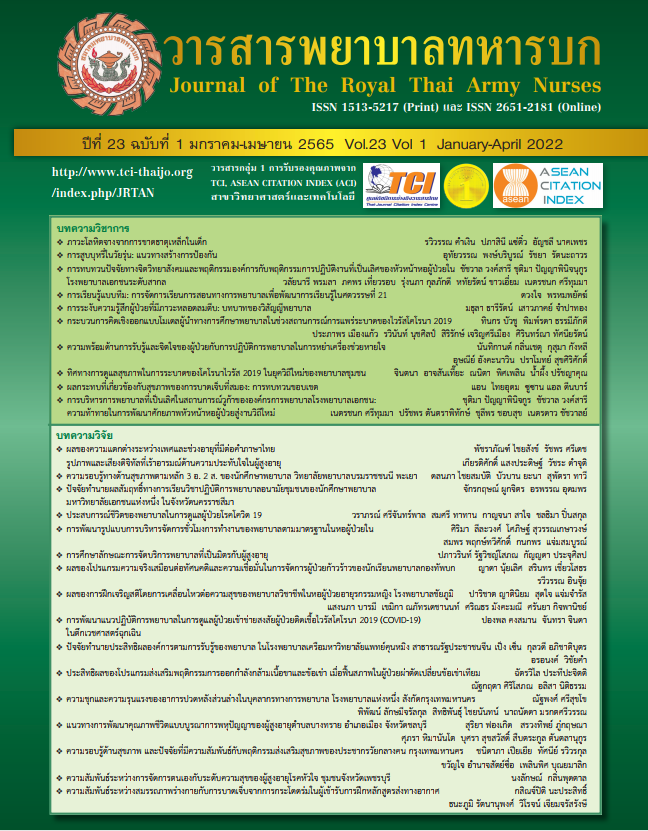Team Based Learning: Learning Strategy in Nursing Education toward the Development of the Twenty-First Century Learning Skill
Team Based Learning: Learning Strategy in Nursing Education toward The Development of The Twenty-First Century Learning Skill
Keywords:
Team Based Learning, Nursing Education, Twenty-First Century Learning SkillAbstract
Many teaching and learning methods in nursing education focus on improving the 21st century life skills of learners. The team-based learning method is one of cooperative learning methods that encourages learners to be responsible and develop their abilities to solve problems and make decisions. It consists of 3 main steps: 1) preparing before class; 2) preparation test before class, which is divided into 3 sub-steps: individual testing, group testing, and providing clarification by teachers; and 3) applying knowledge. This article presents the team-based learning process, based on learners’ roles and instructor’ roles, benefits of team-based learning method on developing the 21st century life skills of the learners, application of the team-based learning in the “Adult Nursing 1” course, factors and conditions of team-based learning method.
Downloads
References
Sinlarat P. 21st Century Skills: Must keep up with western traps. Bangkok: Dhurakij pundit university; 2016. (in Thai)
Saraketrin A, Rongmuang D, Chantra R. Nursing education in the 21st century: competencies and roles of nursing instructors. Journal of The Royal Thai Army Nurses. 2019;20(1):12-20. (in Thai)
Chantra R, Sarakshetrin A. Learning skills in 21st century of nursing students at Boromarajonani College of Nursing, Suratthani. The Southern College Network Journal of Nursing and Public Health. 2017;4(1):180-90. (in Thai)
Chaikongkiat P, Niha S, Chantarasiripoot, B. 21st Century learning skills of nursing students: a survey research in Yala. The Southern College Network Journal of Nursing and Public Health. 2019;6(1):112-20. (in Thai)
Turner K, Leungratanamart L, Niranrat S, Jarnarerux J, Wattanakull B, Reunreang T. Twenty first century skills of nursing students of Boromarajonani College of Nursing, Chonburi. NJMPH. 2015;25(2):178-93. (in Thai)
Suwanjaroen J, Sarakshetrin A, Malai C. Teaching models to enhance the 21st century skills for Bachelor’s degree Nursing Students. Nurs J. 2017;44(4):177-88. (in Thai).
Parmelee D, Michaelsen LK, Cook S, Hudes PD. Team-based learning: a practical guide: AMEE guide no. 65. Med Teach. 2012;34(5):S275-87.
Wuti R, Sittiwong S, Srikrachang C. The effects of Team based learning to enhance learning outcomes under Thai qualifications framework for higher education and self-direction in adult learning of students nurses. Nursing Public Health and Education Journal. 2016;17(3): 69-80. (in Thai)
Sinthuchai S, Ubolwan K, Bunsont i N, Rachawat V. Effects of Team- based learning on problem-solving ability and teamwork perceptions of nursing students: mixedmethod research. Journal of Nursing and Health Sciences. 2019;13(3):1-12. (in Thai)
Lang B, Zhang L, Lin Y, Han L, Zhang C, Liu Y. Team-based learning pedagogy enhances the quality of Chinese pharmacy education: a systematic review and meta-analysis. BMC MED EDUC. 2019;19:286.
Dearnley C, Rhodes C, Roberts P, Williams P, Prenton S. Team based learning in nursing and midwifery higher education; a systematic review of the evidence for change. Nurs Educ Today. 2018);60:75-83.
Jamkrajang T, Khumtaveeporn P. Effect of Team – based learning in basic nursing skill practicum on nursing care skill for patient with medication injection in the second year nursing students. Journal of The Royal Thai Army Nurses. 2016;17(2):194-200. (In Thai)
Branson S, Boss L, Fowler DL. Team-based learning: application in undergraduate baccalaureate nursing education. J Nurs Educ Pract. 2016; 4(6):59-64.
Gullo C, Ha T, Cook S. Twelve tips for facilitating team-based learning, Med Teach. 2015; 37(9):819-24.
Sumrithe S. Team-based learning in Medical Curriculum. RMJ. 2018;41(2):135- 42. (In Thai)
Thaipisutthikun A. Facilitation in Team-based learning. SMB. 2559;9(2):75-83. (In Thai)
Buddhasem D. Learning management for creative thinking development and team learning based on Project based learning approach via infographics. ITMI. 2560;4(1):97-105. (In Thai)
Phansawat M, Inchaithep S, Tinwang W, Pausiri S, Phongkhunakorn N, Thungmiphon P, Robcob W. The effectiveness of Team - based learning on learning achievement, critical thinking, team work skills and self – directed learning readiness of student nurses. Nursing Public Health and Education Journal. 2558;16(2): 92-102. (In Thai)
Frenk J, Chen L, Bhutta ZA, et al. Health professionals for a new century: transforming education to strengthen health systems in an interdependent world. Lancet. 2010; 376(9756): 923-1958.
Yaisoon S, Rattanaviboon P, Chankao C. Effects of Team-based learning on knowledge and perceived learning outcomes in antenatal care of nursing students. TRCNJ. 2559;9(2): 73-87. (In Thai).
Saithanu K, Thani S, Luprasong S. Effect of Team-based learning on learning outcomes according to Thai qualifications framework for higher education for nursing students in the topic of therapeutic relationship. Journal of The Royal Thai Army Nurses. 2019;20(3): 343-52. (In Thai)
Dearnley C, Rhodes C, Roberts R, Williams P, Prenton S. (2018). Team based learning in nursing and midwifery higher education; a systematic review of the evidence for change. Nurse Educ Today. 2018; 60:75-83.
Chen M, Ni C, Hu Y, Wang M, Liu L, Ji X, et al. Meta-analysis on the effectiveness of team-based learning on medical education in China. BMC Med Educ. 2018;18:1-11.
Downloads
Published
How to Cite
Issue
Section
License
Copyright (c) 2022 Journal of The Royal Thai Army Nurses

This work is licensed under a Creative Commons Attribution-NonCommercial-NoDerivatives 4.0 International License.
บทความหรือข้อคิดเห็นใดใดที่ปรากฏในวารสารพยาบาลทหารบกเป็นวรรณกรรมของผู้เขียน ซึ่งบรรณาธิการหรือสมาคมพยาบาลทหารบก ไม่จำเป็นต้องเห็นด้วย
บทความที่ได้รับการตีพิมพ์เป็นลิขสิทธิ์ของวารสารพยาบาลทหารบก
The ideas and opinions expressed in the Journal of The Royal Thai Army Nurses are those of the authors and not necessarily those
of the editor or Royal Thai Army Nurses Association.






